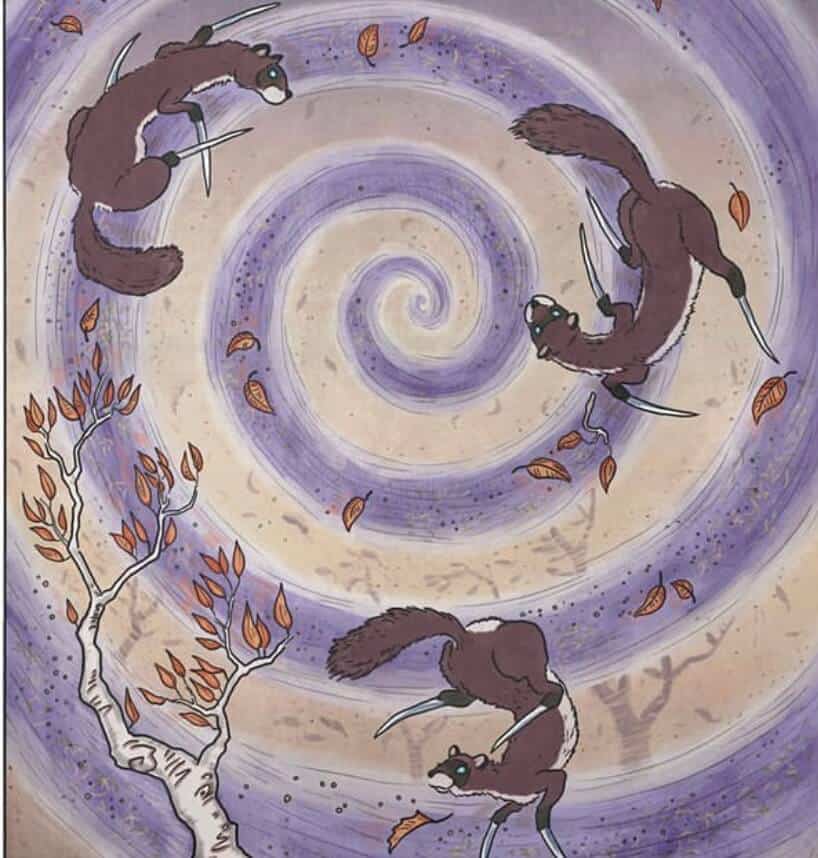Would you like to know the significance and meaning of Itachi in Japanese culture? What is the significance of a Japanese weasel in Japanese culture? Check it out in detail below!
Weasels look terribly cute but have different symbolic values based on the era and background setting.
While Ancient French lore considered them as good luck, the Ancient Greeks regard seeing the Weasel crossing one’s path as bad luck.
In Japan, the term Itachi means weasel and just like in Europe, they are considered to be devious, evil and bad omen associated with death.
- Related: Significance of Kitsune Foxes in Japan
- Related: Significance of Karasu in Japan
- Related: Meaning of Lotus Flower in Japan
In some cases, they even believe an itachi is able to hypnotize and possess people just like Itachi genjutsu from Naruto.
The name Itachi Uchiha was chosen for him because of the character’s background story of killing his entire family.
In this article, we will be not only breaking down the meaning and significance of itachi in Japan but also a little more on Itachi’s character.
Meaning Of Itachi In Japan And Its Significance In Japanese Culture
The Japanese Weasel or Mustela itatsi is a carnivorous mammal that is classified as a subspecies of the Mustela sibirica or Siberian weasel.
Itachi (イ タ チ) of itasi is the name given to the species, they can be found on the islands of Shikoku, Honshu, and Kyushu.
Significance of Itachi In Japanese Culture:
The Japanese weasel has become an important word in the Japanese language. ‘Weasel play’ or ‘itachi gokko’ both refer to repeating the same message.
There is another saying-’Itachi no saigo-pei,’ which translates to ‘the last fart of the weasel.’ This is used to describe the last words of an unpopular speaker.
It is also used when a person displays bravery only when there are no formidable opponents.
However, all these phrases do not really reflect the true temperament of the Japanese weasel.
Even though it is depicted in bad light, the Japanese give Itachi as a baby boy’s name with the hope that the name will have all the good attributes associated with this term such as power and strength.
Itachi & Yokai
Itachi are regarded as pranksters and tricksters, but are generally shy around humans so they are often disliked and not trusted.
Their calls are considered to be ill omens because after their cries are heard, there is usually despair and misfortune that always follows.

A village Japanese legend states that the Japanese weasels have the ability to transform into the Japanese marten and use all kinds of magic when it reaches 100 years of age.
The yōkai named Kamaitachi (鎌 鼬) is depicted with sharp, long nails that are shaped like sickles.
This yōkai is found throughout Japan, but is mostly located in the snow-covered north of Honshu.
They are dangerous in groups as they gather together in the dark and climb up onto each other’s shoulders to create columns of fire which break out into whirlwinds. These are frequently blamed for starting these fires which burn down entire towns.
When you see an itachi standing on its hind legs, it is believed to be bewitching a human and hypnotizing them into performing tasks such as leaving out food for the weasel’s benefit.
Itachis are considered to possess many forms and are very skilled shape-changing animals.
There is an old phrase about this animal yōkai that says: ‘Kitsune nanabake, tanuki hachibake, ten kubake’ that translates into: ‘Foxes seven forms, tanuki eight forms, itachi nine forms.’
They also adopt various forms of yōkai to scare humans. Some examples include-
They tend to take the form of a young priest boy dressed in clothes that are loose for him. They do this to acquire alcohol, which they cannot brew.
Another one is the ōnyūdō which is a big, bald-headed giant who terrorizes villages, and destrous homes, livestock and eats people.
Temperament, Hunting & Habitat Of The Japanese Weasel:
Japanese weasels live solitary lives and because they are prey on many species.
Their temperament and activity is largely controlled by many needs such as mating, feeding cubs, finding food, avoiding predators and harsh weather conditions.
They make different cries and sounds that include barks, squeals, hisses and trills used in various scenarios and circumstances.
They line their dens with feathers and grass and store their food in special hiding places.
They hunt according to their hunger whether it is day or night and hunt mostly along rivers, meadows and suburban areas.
Japanese weasels are outstanding climbers, swimmers, runners, and are able to reach prey even in difficult places.
They inhabit shrublands, plantations, forests and grasslands and are widespread throughout Japan.
They are not found in any of the large cities and their coexistence in the countryside poses a danger to their own lives as many of them die on the roads.
Appearance of Japanese Weasel
- They have an orange-brown coat with dark markings on the head.
- Vary in size depending on the sex.
- Long tail, long slender body, sharp claws and relatively short legs.
- Adult Japanese weasel males can reach 14 inches or 35 cm in body length with a tail length of up to 6.7 inches or 17 cm.
- Females are much smaller.
- Their coat does not change color in winter unlike other weasel species.
- They are similar in appearance to the Siberian weasel but differ in ratio of head length, body length and tail length.
- Small eyes that point direct and forward, and pay perfect attention to what is in front of their noses.
Fascinating Facts About Itachi
- The average lifespan of the Japanese weasel depends on several factors such as food availability, with a maximum life span of about 5 years.
- The Japanese weasel population has declined by 25% putting it in the endangered category list. This is the reason why the Japanese government has banned the hunting of the females to conserve the species.
- They are found in mountainous or forested areas near water.
- Japanese weasels produce a musk, a smelly secretion from the anal gland to scre off predators by rubbing off this secret against branches, rocks and other natural obstacles.
- They are responsible for protecting young trees in winter since they prey on the rodents that gnaw at the roots.
- They are clever, playful, and quick, animals and are known for their habit of stealing food from other creatures which leads to people associating them with sneakiness.
- Their slender body provides great flexibility that helps them to quickly ease its capture into a burrow for safekeeping.
- They see well in the dark and have an excellent sense of smell for further guidance.
Portrayal Of Itachi In Anime
If you are a fan of anime then you will know who Itachi is from Naruto, the famous fictional character and one of the best ninjas in anime.

Itachi is used as a slang term and considered to be an ill omen. Itachi is a very complex character known to have incredible skills and abilities such as strength, power and high IQ level.
Itachi is a popular villain of anime that killed his entire clan besides his brother to show his power. So, the word Itachi represents the sign of bad deeds and power.
Since the character is famous as a bad omen, the slang can be used for anyone with bad intentions, evil signs, evil deeds and bad luck.
Itachi is not only the antagonist but also portrayed as an emotionless character who murdered his clan.
Itachi is also used as a verb which means: ‘to kill everyone around.’ You too can use the Itachi slang in the right context and enhance your Japanese vocabulary.

Meaning of Itachi in Japanese Culture: FAQs
What is the diet of a Japanese weasel?
Are they used as Vermin Control?
Conclusion:
In this article, we have explained the meaning of Itachi and how it is considered a sign of bad luck. To conclude, there are some other fascinating facts about Itachi:
For starters, It has double meanings in the Japanese language-One is bad deeds referred to as wesel and the other one is power.
You will find many Japanese boys with the name Itachi because people believe that this name gives boys power.
Itachi can also be used to describe someone who has strength and good looks.
Itachi is a famous anime character that is known for his incredible powers. Writers use this slang for anyone who shows great power and for a wesel person.
The Itachi also have the strength and powers of technology.
We hope this article will help you gain more insight on this subject. Also, feel free to reach out to us with any queries.
Also Read




